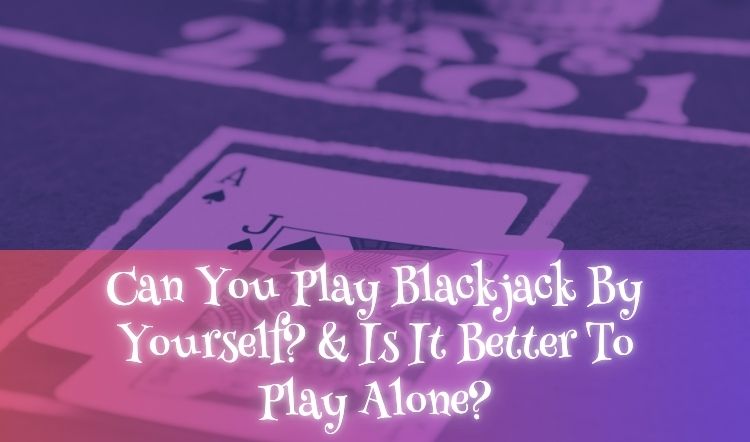
Blackjack is a well-known casino game typically enjoyed in a group setting. Players compete against the dealer with the aim of achieving a hand value of 21, or as close to it as possible, without exceeding that number.
However, what happens when you’re playing solo? Is it possible to play blackjack by yourself–and could it even be preferable? In this article, we explore the options and potential advantages of playing alone. Read on to learn more.
Can You Play Blackjack By Yourself?
While blackjack is traditionally a social game—typically played at a table with other players and a dealer—it is entirely possible to play on your own, depending on the format.
There are several reasons why you might choose to play solo. Perhaps you want to practise your strategy in a low-pressure setting, or maybe you're simply looking for a bit of entertainment without the need for interaction.
If you’re interested in playing blackjack by yourself, one of the most accessible ways to do so is online. Many websites and mobile apps offer single-player blackjack games, allowing you to play whenever it suits you. Some land-based casinos also feature electronic blackjack machines, which let you play independently without needing to wait for a table.
You might also consider using a blackjack training tool, such as a strategy trainer. These come in various formats—apps, software, or even books—and are designed to help you refine your decision-making and understanding of the game.
That said, playing blackjack on your own may become repetitive over time. A big part of the appeal for many players is the social element—the interaction with others, the shared experience, and even learning from how other players approach the game. Without that, you might find it harder to stay engaged or to develop your skills as quickly.
Is It Better To Play Blackjack Alone?
Whether it's better to play blackjack alone really depends on what you're hoping to get out of the game. If you're just starting out, playing solo can be a useful way to learn the basics of blackjack and get comfortable with the rules at your own pace. It also gives you the space to practise your approach without the pressure of other players watching or waiting.
You might also find that playing alone suits you if you prefer a quieter, more focused environment. Without the distractions of a busy table, it may be easier to concentrate, reflect on your decisions, and develop your understanding.
That said, blackjack is ultimately designed as a social game, and there are some potential advantages to playing with others. For one, it may simply be more enjoyable. For many players, interacting with other players adds to the overall experience. Watching how others play can also be a learning opportunity—you might notice decisions or mistakes that help shape your own approach.
There's also the social element to consider. Playing at a table with others may lead to casual conversation, shared moments, and even the chance to make new connections. For some players, this is a large part of what makes the game entertaining.
Of course, you may prefer to play alone for personal reasons. Some people value their privacy or feel self-conscious playing in front of others, and that’s completely valid. In the end, it comes down to personal preference and what kind of experience you’re looking for.
So, is it better to play alone? It depends on your goals and what you enjoy most about the game. There’s no right or wrong approach—just the one that works best for you.
What Are The Odds of Winning Against The Dealer?
The odds of beating the dealer in blackjack can vary, depending on the specific rules of the game and how a player chooses to play. If a player is effectively implementing optimal basic strategy, which is a well-established set of guidelines that suggests the best move based on a player’s hand and the dealer’s visible card, they can generally improve their chances, typically lowering the house edge to around 0.5-1%.
That said, these odds are also influenced by other factors, such as the number of decks in play. As a rule of thumb, the more decks used in the game, the lower a player’s chances of winning. Fewer decks tend to work more in a player’s favour.
It's also worth noting that certain rule variations can shift the odds. For example, if the dealer is required to hit on a soft 17 (a hand containing an Ace counted as 11), the advantage slightly leans towards the house. On the other hand, games that allow a player to double down on any two cards—or offer other player-friendly rules—can tip the odds a little more in their favour.
What Happens If You Beat The Dealer In Blackjack?
If you beat the dealer in blackjack, you'll typically receive a payout based on your original bet. In most cases, the standard payout is 1:1—so if you wager £10, you’d win an additional £10. However, some games or casinos might offer different payouts depending on the hand.
For example, if you’re dealt a natural blackjack (an Ace and a 10-value card), you might receive a higher payout—usually 3:2. That means for every £2 you wager, you could win £3. Some casinos may also offer bonuses for specific hand combinations, so it’s worth being aware of any special rules that might apply.
If the dealer goes bust and your hand is still in play, you’ll also win, and your payout will be based on the standard rules of the table. But if you and the dealer end up with the same hand value, it’s called a “push.” In that case, your original bet is returned to you—neither a win nor a loss.
To avoid surprises, if you choose to play, it’s always a good idea to check the specific rules and payout structures at the casino or online platform you’re playing on before you start.
How To Play 1v1
Playing blackjack one-on-one—often referred to as 1v1—simply means playing against the dealer without any other players at the table. The objective remains the same: try to beat the dealer’s hand by getting a total as close to 21 as possible without going over.
If you’re interested in playing 1v1, to get started, you would place your bet, and the dealer will deal two cards to you and two to themselves. Usually, both of your cards are dealt face up, while the dealer shows one card face up and keeps the other face down.
From there, you’ll decide how to play your hand. You can choose to hit (take another card) or stand (keep your current total), depending on your hand and the dealer’s visible card. If your hand goes over 21, that’s called a bust, and you lose the round automatically.
Once you’ve finished your turn, the dealer reveals their facedown card and plays according to the house rules—typically hitting until they reach 17 or higher. Some casinos may also offer additional options like surrender, insurance, splitting pairs, or doubling down, so it's a good idea to familiarise yourself with these features beforehand if you choose to play.
Understanding how 1v1 blackjack works can make the game more straightforward and enjoyable. It also gives you the chance to focus entirely on your own approach without the distraction of other players at the table.
In short, if you’re thinking about playing blackjack on your own, it helps to understand how the game is structured, what your chances might be, and what happens when you beat the dealer. Taking a few moments to learn the rules and check the casino’s specific variations and payout structures can help you make the most of the experience.
As always, if you choose to play blackjack, always keep responsible gambling practices in mind, and never wager more than you are willing to lose.
*All values (Bet Levels, Maximum Wins, etc.) mentioned in relation to this game are subject to change at any time. Game features mentioned may not be available in some jurisdictions.
**The information provided in this blog is intended for educational purposes and should not be construed as betting advice or a guarantee of success. Always gamble responsibly.
